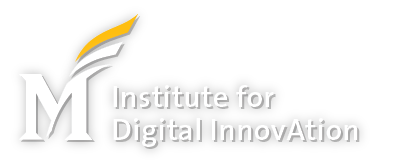Faculty Spotlight: Hemant Purohit 
Hemant Purohit is the director of the Humanitarian Informatics Lab and an Associate Professor of Information Sciences and Technology in the School of Computing at George Mason University.
The Institute for Digital InnovAtion talked with Purohit about his research and the Humanitarian Informatics Lab. Responses have been edited for length and clarity.
Tell us about your Center.
My research passion is to study human behavior in online spaces such as social networks and web forums. Our Humanitarian Informatics Lab does research in the broad area of Human-Centered Computing, on the design and analysis of interactive intelligent systems that can extract behavioral patterns from online data sources and help manage unstructured data at scale in real time. This leads to useful application designs for augmenting human task performance for information processes within different organizations working toward humanitarian good and welfare of society. For example, helping our local and national services involved in response and recovery from disaster events, and tackling societal issues such as gender-based violence. We leverage Natural Language Understanding, Data Mining, and Machine Learning methods to mine meaningful behaviors from large-scale data to develop systems that can empower decision-makers and policymakers in our communities with real-time decision support.
We also study people’s behavior related to social problems like hate speech and gender stereotyping. Our research is well-connected to the United Nations’ 17 Sustainable Development Goals (SDGs) whether by means of researching in natural disaster management, improving crisis communications, or mitigating threats to the welfare of our society and social harmony. We are also looking at problems related to cyber security in the online spaces, especially human behaviors with malicious intentions that could be meaningfully used to identify target attackers of disinformation campaigns in a timely manner.
What kinds of projects are funded?
Our lab is funded by projects from the National Science Foundation across the areas of natural disaster management, human-machine teaming, and social problems including stereotyping, diversity, and inclusion.
In addition, we have received funding from the Commonwealth Cyber Initiative (CCI) to address how to manage and understand the counter forces that are at play in the online social spaces that are threats to the governments and the policy institutions.
Besides this, we have also received funding from places like GMU’s 4VA program, the Office of Naval Research, and we have built collaborations internationally in Norway. The Research Council of Norway has supported a project creating a transnational partnership between universities around the world for big data in emergency management. The project focuses on creating educational artifacts and ways in which we can support the training and create educational mechanisms using several emerging technologies for our emergency responders.
How does your project impact other disciplines?
We are interested in empowering human actors in workplaces or organizations and automating some of their tasks to augment their work performance, rather than replace them. These human actors could be in an emergency service or a public service supporting decision-makers, or assisting and writing about policymaking. To accomplish that, we blend the non-computational sciences for the theoretical side with the power of computational sciences for large-scale computation methods to analyze big data sources online.
So, the way we conduct this dual approach of learning from and the impact on other disciplines is via validating the theories that have been constructed through small-scale observations by means of using large scale data.
For instance, one of the recent projects we have been doing is with GMU’s Center for Climate Change Communication. We have been working with Professor Ed Maibach to figure out ways to evaluate the training programs conducted to improve communication about climate change.
Similarly, you can also see other kinds of examples in past projects where we have designed tools that mine all this social data in real time. Other examples include intelligence gathering and extraction of information that helps understand how people behave in online social networks or online social spaces. Over time, there is a perception that others start to build because of this kind of malice that goes on in those online conversations. So, when we discussed this problem with the public policy experts at GMU in the Schar School, we worked on this theory of social construction and how social construction of certain types of identities in the online spaces is discussed. And that gave us an opportunity to see an interesting novel problem of malicious intent detection for human behavior. So, there is a computations problem informed by the theoretical framework that we studied, and that also received the best research paper award at one of the prestigious IEEE/ACM international conferences.
We collaborate extensively with other disciplines: cognitive psychology, social sciences, communications, public policy, linguistics, and many others. We use such opportunities to advance the computational side in connection with all the theories that we understand and the knowledge that we have in the non-computational sciences. This leads to creating methods that help us find more meaningful, innovative, and interpretable solutions for the complex problems, whether related to natural disasters, social problems, or a type of cybersecurity crisis.
What projects would you like to be reached out to for potential collaborations?
That is a great question. I am interested in humanitarian problems with broad social impact across different SDGs in the United Nations’ vision, via human-centered computing research. We are open to collaborating in any of those SDGs. The examples that I gave touch upon many of those SDGs related to Smart Cities and Communities, community governance, natural disaster-related like community resilience and disaster management, or wellbeing of our society. We would be willing to expand further to other SDG areas.
We are interested in the research direction to analyze and mitigate various kinds of biases when we design automated, interactive intelligent systems focused on extracting patterns for human behavior from natural language and multimodal data. Finding ways to mitigate biases in the design of systems is a major interest area of our lab currently and we would like to seek collaborators from non-technical sciences to help us characterize different forms of biases.
We are also interested in designing systems with greater human agency in the human-AI collaboration or human-machine teaming, or more specifically, human-in-the-loop machine learning (HITL-ML) systems. A unique aspect that one of my PhD students is exploring is how humans make errors in such HITL-ML systems and not just machine learning models, and we want to create ways to prevent them from making those errors. For example, our research is to understand errors when people annotate or code data for machine learning models. We are using that knowledge to define a framework that will allow us to define a novel computational problem that is jointly augmenting performance of human actors and machines together. Therefore, human-centered computing for human-AI collaboration and teaming is another core area of our research interest and we seek collaborators with theoretical expertise in both collective and teaming behavior.
What keywords describe your research?
Human-centered computing, social computing, crisis informatics, natural language understanding, and human-AI collaboration.
How does your center help bring the Mason community together?
We have in our lab currently, all the way from an undergraduate research assistant to a postdoc with diverse backgrounds, and collaborators ranging from engineering to social sciences, psychology, and many other disciplines. Students who are interested in working in the lab can reach out to me directly.
How can you be reached?
Anyone interested in collaborating, working with us for research projects, or for funding proposals, is welcome to email me at hpurohit@gmu.edu and connect with us via the Humanitarian Informatics Lab social media channels on Twitter or LinkedIn.

